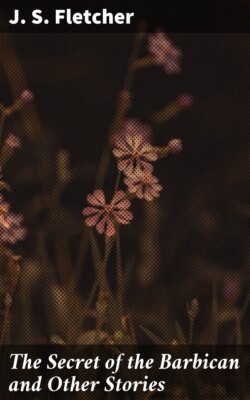Читать книгу The Secret of the Barbican and Other Stories - J. S. Fletcher - Страница 16
На сайте Литреса книга снята с продажи.
The Sub-Dean’s Advice——Chapter III
ОглавлениеTable of Contents
The sub-dean, a bachelor clergyman for whom Linkwater had a great respect, lived in rooms in the High Street, and he was toasting his toes at his fire, and reading a new pamphlet which had just been issued on a debatable point of Greek grammar, when the verger, carrying his parcel, was shown in to him. He stared over his spectacles as Linkwater set the parcel on the table.
“Hallo, Linkwater!” he said. “What have you got there? What’s that mysterious looking object?”
“Sorry to intrude upon you, sir,” replied Linkwater in his suavest tone. “I ventured to call, sir, desiring your advice. The fact is, sir—I don’t think you knew I had a brother—Nelson Linkwater, sir?”
“No,” answered the sub-dean. “Hadn’t any idea of it.”
“This is his ditty box, sir,” continued the verger, with a side glance at his parcel. “He was a seafaring man. A ditty box, sir, is what they keep their little belongings in. The fact is, sir, my brother is—deceased. I had not seen him for many years. But he remembered me, sir. I have been over to Salport to-day, to receive this box from the hands of another seafaring person, to whom my brother entrusted it—on his death-bed, sir, for conveyance to me. Just arrived from Bombay, sir, this person I speak of. And—there are matters in that box, sir, on which I should be glad of your advice.”
“Nothing—nothing alive, I hope?” suggested the sub-dean a little anxiously. “No snakes—nor centipedes—eh, Linkwater?”
“Nothing of that sort, sir,” said Linkwater, producing the key. “No, sir—far different matters; you needn’t be afraid, sir. Just the little things, curiosities and the like, sir, that a sailorman picks up and keeps,” he continued, as he threw back the lid, and began to lay before the sub-dean’s astonished eyes the odds and ends which he had bought of Mr. Issachar. “You see the sort of thing, sir. No great value, sir; but this purse, sir, contains something very different.”
He took the strip of canvas from the purse, unfastened the clasp and shook out the jewels. The sub-dean gasped, as the light from his lamp caught the gleam of diamonds, the blood-red of the rubies, the delicate blue of the sapphires.
“Bless my heart, Linkwater!” he exclaimed. “Why, those stones must be worth a fortune! And—your brother’s left them to you?”
Linkwater coughed behind his lifted hand.
“The seafaring man’s words, sir—name of Sprigg, sir, Silas Sprigg—quite a stranger to me until this afternoon, sir—were that my brother entrusted this box to him with a message,” he said. “All that was in it for brother, James Linkwater—with his blessing, sir. So I suppose these are rightfully mine, sir. You consider them valuable, sir?”
The sub-dean polished his spectacles, and looked carefully at the stones, turning them over gingerly with the tip of his little finger.
“I am no great hand in judging these things, Linkwater,” he said presently. “But I should say these stones are very valuable. Why, look at the size—and the fire of these diamonds! And those rubies! Rubies are exceedingly valuable, you know.”
“Indeed, sir?” remarked Linkwater. “Ah, I wasn’t aware of that, sir. Naturally I haven’t any knowledge of these things. Do you think Mr. Waterman, the jeweller, would buy them from me, sir?”
“Waterman!” exclaimed the sub-dean. “Dear me! I don’t suppose Waterman could afford it, Linkwater! Why, my good friend, these stones may be worth thousands! Where do you suppose your brother got them?”
Linkwater shook his head solemnly.
“I couldn’t say, sir,” he replied. “Nelson was a rolling stone, sir. He saw many strange places in his time. He was a great deal in India—and in Burma, sir.”
“Burma, I believe, is a great place for rubies,” remarked the sub-dean. “Dear me, this is very interesting! Well, I know what I would do if I were in your place, Linkwater—I should offer them to one of the great London firms. There must be—there are—great London jewellers who buy precious stones. I’ll tell you what I’ll do if you like. I have to go to town the day after to-morrow and I shall stay there for two or three days. I’ll make inquiries for you.”
Linkwater, always the politest of men, bowed his thanks.
“If I might be allowed to suggest, sir,” he said, “and if it would be no trouble to you, perhaps you wouldn’t mind showing these things to one of those firms you speak of? You would know better what to say to them. If it is not trespassing too much on your time, sir?”
“All right, all right, I will,” replied the sub-dean, who was a very good-natured man. “I remember now—there’s Morkin’s of Bond Street. They’re very famous people. But it’s rather a responsibility having those stones on hand, Linkwater. Won’t you be anxious about them?”
Linkwater smiled in a confidently superior manner.
“Not at all, sir,” he answered. “So long as you have them. I believe you have a safe, sir—if you wouldn’t mind putting the jewels in there until you go up to town.”
The sub-dean pulled out his keys. Then he and the verger counted the stones and locked them up. After which Linkwater went away with the ditty box and the clergyman returned to his pamphlet, and found himself wondering between every line however Nelson Linkwater came to possess those diamonds and rubies.
